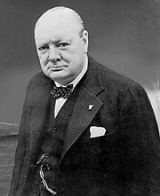
1874 Winston Churchill is born at Blenheim Palace in Oxfordshire, Great Britain.
1901 Winston Churchill makes his maiden speech in the House of Commons.
1906 Sir Henry Campbell-Bannerman's cabinet (which included amongst its members H. H. Asquith, David Lloyd George, and Winston Churchill) embarks on sweeping social reforms after a Liberal landslide in the British general election.
1911 Churchill is elected First Lord of the Admiralty for the first time.
1940 World War II: Winston Churchill is appointed Prime Minister of the United Kingdom.
1940 World War II: Germany's conquest of France begins as the German army crosses the Meuse. Winston Churchill makes his "blood, toil, tears, and sweat" speech to the House of Commons.
1940 "Finest Hour" speech by Winston Churchill.
1943 World War II: Franklin D. Roosevelt and Winston Churchill begin the Casablanca Conference to discuss strategy and study the next phase of the war.
1943 World War II: Franklin D. Roosevelt becomes the first President of the United States to travel via airplane while in office when he travels from Miami, Florida to Morocco to meet with Winston Churchill.
1943 World War II: Franklin D. Roosevelt and Winston Churchill conclude a conference in Casablanca.
1943 World War II: British Prime Minister Winston Churchill and U.S. President Franklin D. Roosevelt set Monday, May 1, 1944 as the date for the Normandy landings ("D-Day"). It would later be delayed over a month due to bad weather.
1943 British Overseas Airways Corporation Flight 777 is shot down over the Bay of Biscay by German Junkers Ju 88s, killing actor Leslie Howard and leading to speculation the downing was an attempt to kill British Prime Minister Winston Churchill.
1943 World War II: First Québec Conference of Winston Churchill, Franklin D. Roosevelt, and William Lyon Mackenzie King begins.
1944 Franklin D. Roosevelt and Winston Churchill meet in Quebec as part of the Octagon Conference to discuss strategy.
1945 World War II: The Yalta Conference between the "Big Three" (Churchill, Roosevelt, and Stalin) opens at the Livadia Palace in the Crimea.
1945 World War II: the leaders of the three Allied nations, Prime Minister of the United Kingdom Winston Churchill, President of the United States Harry S Truman and Soviet Premier Joseph Stalin, meet in the German city of Potsdam to decide the future of a defeated Germany.
1945 The Labour Party wins the United Kingdom general election of July 5 by a landslide, removing Winston Churchill from power.
1946 Winston Churchill uses the phrase "Iron Curtain" in his speech at Westminster College, Missouri.
1946 The Council of Europe is founded following a speech by Winston Churchill at the University of Zurich.
1952 The British government, under Winston Churchill, abolishes identity cards in the UK to "set the people free".
1952 British Prime Minister Winston Churchill announces that his nation has an atomic bomb.
1953 Winston Churchill is knighted by Queen Elizabeth II.
1955 Winston Churchill resigns as Prime Minister of the United Kingdom amid indications of failing health.
1965 The Hamilton River in Labrador, Canada is renamed the Churchill River in honour of Winston Churchill.

